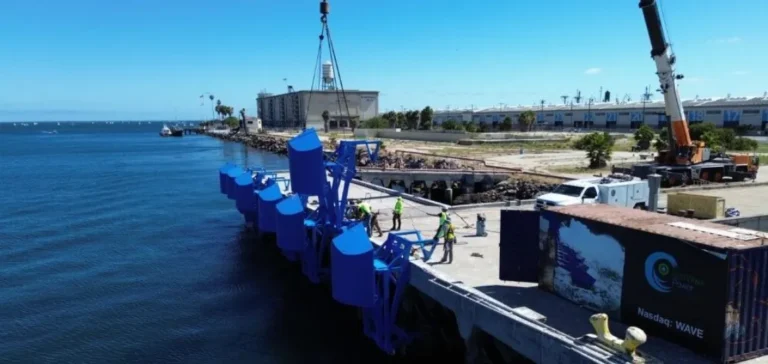Stockholm-based company Eco Wave Power Global AB (publ) has achieved a significant industrial milestone with the commissioning of its first wave energy pilot station in the United States. Located at the Port of Los Angeles, the demonstrator has officially entered its operational phase following the completion of technical tests. The launch of the floaters, the system’s central component, was carried out for the first time during a live broadcast on Good Morning America.
This industrial step follows the full completion of on-site work, including installation of the floaters, connection of hydraulic pipelines and placement of the land-based energy conversion unit. Unlike offshore systems, Eco Wave Power’s patented technology is based exclusively on existing coastal structures, reducing maintenance costs and exposure to ocean conditions.
A demonstrator designed for regulatory validation
The Los Angeles project was developed as a demonstration platform to test the performance of the technology in a U.S. coastal environment. The installation also supports environmental monitoring procedures carried out in collaboration with the United States Army Corps of Engineers, along with other local authorities involved in regulating marine projects.
The site also functions as an information hub for industry professionals, government representatives, and potential market stakeholders. The stated goal is to initiate future commercialisation steps nationwide, based on the demonstrator’s technical results and its integration into the port landscape.
Local production and industrial collaboration
Eco Wave Power collaborated with several California-based companies to ensure the assembly and installation of its equipment. The floaters were manufactured by All-Ways Metal, a woman-owned company specialising in industrial metalwork. Installation was handled by C&S Welding Inc., a family-run business based in Wilmington with nearly two decades of experience in marine infrastructure.
The company plans to hold an official unveiling ceremony on September 9 at the AltaSea centre at the Port of Los Angeles. This stage marks the launch of a gradual strategy to integrate wave energy into U.S. coastal infrastructure, with future projects planned for direct grid connection.






















